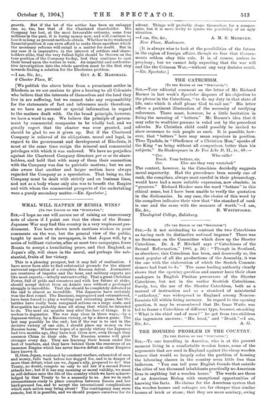[To THE EDITOR OP THE "EPECTATOR." .. 1 Sra,—Your editorial comment on
the letter of Mr. Richard Barnes in last week's Spectator disposes of his objection to the phrase in the Catechism, "to do my duty in that state of life, unto which it shall please God to call me." His letter offers a pertinent illustration of the necessity of verifying references. There must, however, be a little hesitation in fixing the meaning of "betters." Mr. Barnes's idea that it may refer to wealthier persons is ruled out by the precedent adverbs. No Christian child could possibly be invited to show reverence to rich people as such. It is possible, how- ever, that " betters " here may mean superiors in position. Thus Tyndale, in "Obedience of a Christian Man," speaks of the King "as being without all comparison, better than his subjects." So Shakespeare in As You Like It, II., iv., 68 :— " Cor. Who calls? Touch. Your betters, sir.
Cor. Else are they very wretched."
The context, however, in the Catechism decidedly suggests moral superiority. Had the precedence been merely one of rank, the compilers, always most careful in their phraseology, would have had a more suitable expression, now obsolete, in "greaters." Richard Hooker uses the word "betters" in this ethical sense, but I have been unable to verify the quotation in the dictionaries. In any case, the choice of this word by the compilers indicates their view that "the standard of rank is one and the same with the measure of worth."—I am,










































 Previous page
Previous page